Sparring is an essential part of any fighter’s training regimen. It allows them to work on their techniques and strategies in a live setting and can help them improve their skills. However, if you’re not careful, you can make mistakes that can cost you in a real fight. Also, it is crucial to know the biggest sparring mistakes fighters make and how to avoid them.
Sparring Too Hard
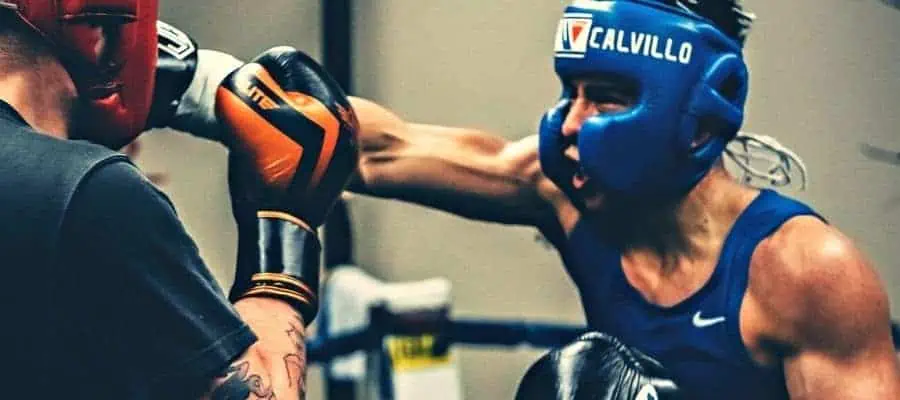
You will not last long if you go all-out in every sparring session. You’ll get tired quicker, and your form will start to suffer. This can lead to bad habits that will be difficult to break when you’re in a real fight. Instead, focus on working on your techniques and strategies. Try to keep the intensity level to a point where you can still maintain good form and breathe normally.
Sparring is an excellent way to improve your boxing skills. However, there is such a thing as sparring too hard. If you find yourself sparring too hard, it can lead to several problems. For one, you may gas out and tire yourself out. This will make the sparring session less productive and leave you more vulnerable to getting hit by your opponent.
Fighters need to be careful of overtraining and injuring themselves while sparring. In addition, if you are often sparring at a high intensity, you are more likely to get hurt. So how do you know if you are sparring too hard? There are a few signs to look for.
One sign that you may be sparring too hard is if you find yourself getting tired quickly. If you feel you are running out of energy midway through a session, you push yourself too hard. Another sign is if you find yourself getting hit more often than usual. This can result from being too aggressive or unable to focus because you are too tired.
If you notice either of these signs, it is important to back off and take a break. It is better to have a shorter, less intense sparring session than to risk injury or overtrain.
Not Warming Up
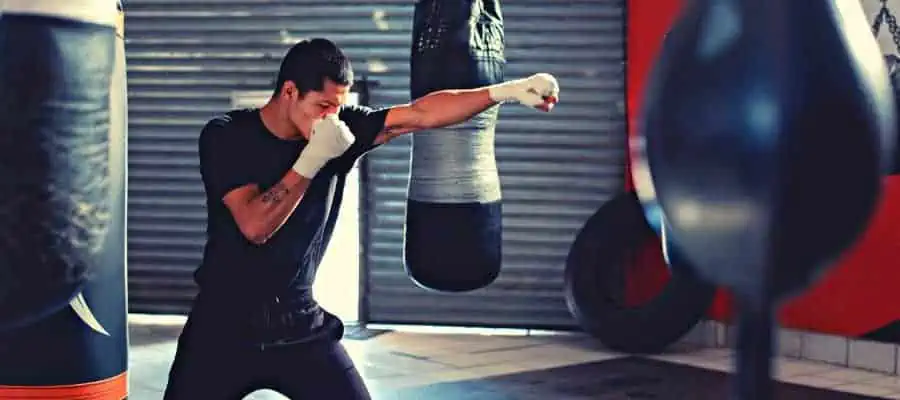
Like with any other physical activity, it’s important to warm up before you start sparring. One of the most common mistakes is not warming up before the sparring. This can lead to severe injuries, as muscles and tendons are more susceptible to damage when they are cold.
Warming up will help increase blood flow to the muscles and tendons and help prepare them for the rigors of sparring. A proper warm-up will help you avoid injuries and will improve your performance.
Start with light cardio to get your heart rate up, then do dynamic stretching to loosen up your muscles. Once you’re feeling good, you can start sparring.
Forgetting Your Footwork

Footwork is essential in both boxing and MMA. It allows you to create angles and maintain distance from your opponent. If you’re not paying attention to your footwork, you’ll likely get hit a lot more than you’d like.
One of the most common mistakes that sparring partners make is forgetting their footwork. Footwork is essential in sparring; forgetting it can lead to severe problems. Here are a few things to keep in mind when you’re working on your footwork:
- Remember to keep your feet moving. This seems like a no-brainer, but it’s easy to get caught up in action and forget to keep your feet moving. Shifting your weight and repositioning your feet will help you stay balanced and ready to react to your opponent’s movements.
- Don’t get tunnel vision. You need to be aware of your surroundings and be prepared to react to anything that might happen. It’s easy to focus solely on your opponent when you’re sparring, but this can be a mistake.
- Be light on your feet. This will help you stay agile and ready to move in any direction.
With these tips in mind, you should be able to avoid making the common mistake of forgetting your footwork. Remember, footwork is essential in sparring, so make sure you’re always paying attention to it! So, focus on your footwork and stay light on your feet.
Not Using The Right Protective Gear
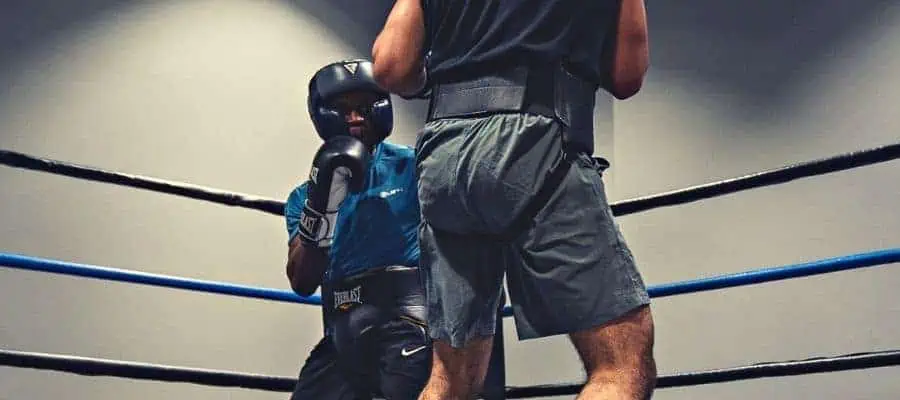
Another common sparring mistake is not using the proper size gloves. Gloves that are too small can limit your movement and make it difficult to grip your opponent. Too large gloves can slip off during the match and cause serious injuries. Make sure you try different sizes before settling on a pair of gloves that fit but don’t restrict your movement.
Another common mistake is not using the proper size headgear. Headgear that is too light can fail to protect your head from hard punches, while headgear that is too heavy can impair your vision and movement. Please make sure you find headgear specifically designed for your size so that you can be sure it will offer the right level of protection.
Finally, many people forget to use a mouthpiece when they are sparring. This can lead to severe injuries if you are punched in the mouth. A mouthpiece will protect your teeth and gums from being damaged by your opponent’s punches. Make sure you choose a mouthpiece that is comfortable to wear and that fits snugly over your teeth. It is very important to know how to choose the right equipment for yourself.
Not Keeping Your Hands Up

We’ve all been there – in the middle of a sparring match, getting tired and letting our hands drop for a second. And, of course, our opponent takes advantage and gets a shot in. It’s a frustrating feeling but also one that fighters can easily avoid.
The next time you’re sparring, keep your hands up at all times. It’ll help you avoid those pesky shots and maybe even help you land a few of your own. A good rule of thumb is always to keep at least one fist on your chin.
This will help you keep your hands up and also give you a little bit of extra protection. This will help protect your head and face from getting hit. It might feel awkward initially, but keep your hands up as much as possible.
Lowering Your Guard

Another mistake that fighters make is lowering their guard. This leaves them open to counterattacks from their opponents. It’s a common mistake to let your guard down during sparring. You might think you’re in a safe environment and your opponent will not hurt you.
However, this is not the case. It doesn’t matter that sparring is just a training session. You’re mistaken if you constantly drop your guard and hope your partner won’t hit you. Sparring is a training exercise where participants try to score points or land clean hits on each other.
As such, it’s important always to keep your guard and alert to your opponent’s movements. If you let your guard down, you leave yourself open to getting hit and could even get seriously injured. So next time you’re sparring, keep your guard up at all times! Keep your hand up and your chin down!
Not Moving Your Head

A common mistake that fighters make is not moving their head enough. This leaves them open to getting hit by their opponents. When you’re in a sparring match, move your head. If you don’t, you’re asking to get hit.
Many things go into a successful sparring match, but if there’s one rule that trumps all others, it’s this: move your head. You give your opponent a free shot if you don’t keep your head on a swivel. And in boxing and MMA, a free shot can mean the difference between winning and losing.
So next time you’re in the ring or cage, keep your head moving. It just might be the key to victory. You do not have to move your head excessively. Just move it enough for your opponent to miss. Make sure to move your head a lot when you’re sparring. Side-to-side movements are particularly effective in avoiding punches.
Telegraphing Your Shots
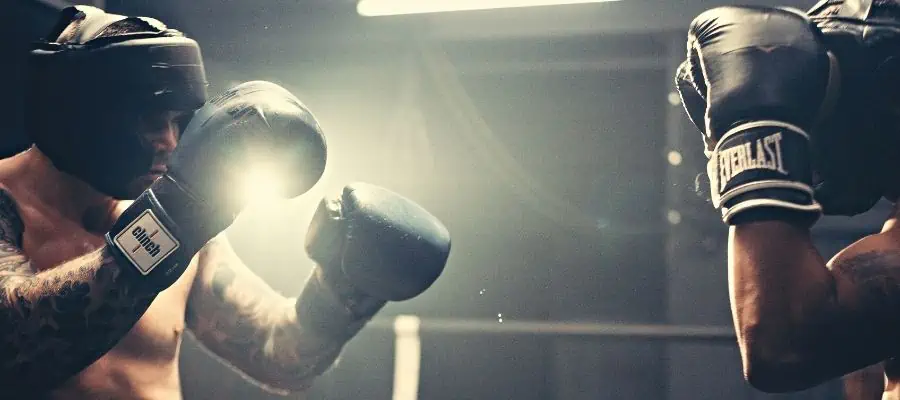
If you telegraph your shots, your opponent will be able to see them coming and will be able to counter them. So, try to be as sneaky as possible when throwing punches. This means not winding up too much and not giving away your intentions with your body language.
When you’re sparring, it’s essential to be as deceptive as possible. One of the biggest mistakes you can make is to “telegraph” your punches by moving your body in a way that makes it obvious what you’re about to throw. This gives your opponent time to react and defend, which can ruin your chances of landing a clean shot.
Keep your hands up and close to your face to avoid telegraphing your punches. When you’re ready to throw a punch, do so without moving your entire body first. Instead, cock your arm back and deliver the punch with a quick wrist snap. If you can do this without giving away what you’re about to do, you’ll be more successful in landing your shots.
Not Relaxing And Being Playful

It’s important to relax when you’re sparring. If you’re tense, you’ll tire yourself out more quickly and won’t be able to perform at your best.
One of the most common mistakes people make in sparring is a lack of relaxation and playfulness. It’s easy to get tense and severe when you’re fighting, but this will make you more likely to make mistakes. This doesn’t mean you should let your guard down but focus on enjoying the experience rather than taking it too seriously. Instead, try to relax and have fun with it.
You’ll be much more successful in your fights if you can learn to relax and be playful while sparring. Not only will you be less likely to make mistakes, but you’ll also be able to flow more easily and enjoy the experience more.
So, take a deep breath and relax as much as possible. This will help you last longer in the ring and throw better punches.
Sparring with the Wrong Person

Finally, ensure you’re sparring with someone of a similar size, weight, and skill level. You will likely get discouraged if you’re sparring with someone much better. If you’re sparring with someone much worse, you won’t be able to improve as much.
And if you’re sparring with someone who is an entirely different size than you, it can be dangerous. So find a good sparring partner and stick with them.
Bonus Tip/Mistake: Not Trying New Techniques or Combinations
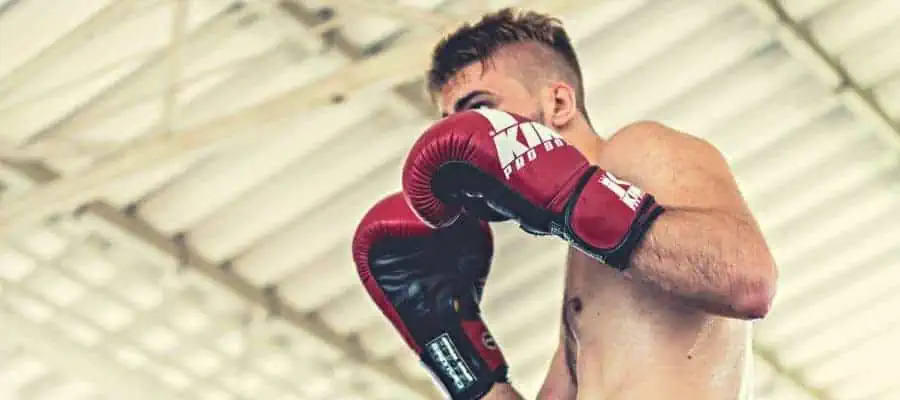
The key to being a great boxer is to have variety in your arsenal and be unpredictable. A colossal mistake when sparring in boxing is not trying new techniques or combinations. Instead, many boxers spar the same way every time.
This can lead to developing bad habits and not being able to show your true potential when it matters most. You also need to try and unlearn some bad habits you might have picked up along the way. When you’re sparring, always try new techniques and combinations. This will help you develop as a boxer and show your true potential when it matters most.
Also, don’t be afraid to experiment with different styles. If you usually fight orthodox, try southpaw for a round or two. This will keep your opponents guessing and make you a more well-rounded fighter.
Conclusion
Sparring is a great way to improve your skills as a fighter. But if you make any of these ten mistakes, it can be detrimental to your training. Remember, sparring is a great tool to develop your technique and skills. Sparring also helps you become more confident in your previously learned techniques. Try out new things, be playful and always respect your training partner.
So, avoid them, and you’ll be on your way to becoming a better fighter. Thanks for reading!
Recent Posts
What is Manachai's Fighting Style? Unveiling Muay Thai Mastery
Manachai, a celebrated figure in the Muay Thai world, has captivated audiences with his exemplary martial prowess. Hailing from the heartlands of Thailand, his name is synonymous with the art of...
What Was Chamuekpet Hapalang's Fighting Style? Unveiling Techniques
Chamuekpet Hapalang was a renowned figure in the world of Muay Thai (record 200-48-2), embodying a fusion of Muay Bouk and Muay Khao styles. Originating from Thailand, the art of Muay Thai is known...
